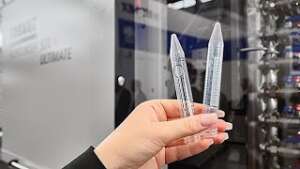IML-In-Mold-Labeling Potential to Revolutionize Medical Technology
Mold-Labeling (IML) has become a staple in packaging, but will its adoption usher in a technological revolution?
The industry is captivated by the possibilities of this new technology, allowing for seamless integration of additional features into plastic components. These enhancements hold promise, particularly in the pharmaceutical and medical sectors, offering novel avenues for benefits and market expansion.
With Mold-Labeling (IML) gaining traction, could we be on the cusp of a technological paradigm shift?
The allure of the latest technology lies in its capacity to incorporate supplementary functionalities into plastic parts, a development of keen interest to the pharmaceutical and medical industries for its potential to unlock new advantages and markets.
Mold-Labeling (IML) has evolved beyond its conventional packaging role, prompting speculation about its transformative impact on technology.

Reduce risk and avoid mistakes
Ensuring the safety of products and preventing mishandling errors are fundamental in medical technology. This encompasses all products within pharmaceuticals, medical equipment, and laboratory diagnostics, catering to diverse applications and delivery methods. The Integrated Mold Labeling (IML) process streamlines production, yielding a final product in a single step and thereby curbing end-to-end manufacturing expenses.
In stark contrast to prevalent manufacturing methods, IML offers an assurance of product safety. Unlike self-adhesive labels prone to peeling or replacement, IML ensures authenticity without compromise. The latest iteration of IML, when coupled with sophisticated downstream systems, meticulously tracks the entire product manufacturing journey. This obviates the necessity for decoration processes like printing, which are susceptible to scrap, thereby mitigating logistical complexities and space requirements while also minimizing the risk of contamination.
Label ensures digital traceability
In the medical sector, connectivity and traceability are becoming indispensable. The advent of digitization heralds a realm of opportunities, facilitating improved doctor-patient communication and enhanced traceability across medical product supply chains. Integrated Mold Labeling (IML) emerges as a cornerstone, ensuring efficacy and safe utilization through its distinctive coding system.
The cutting-edge iteration of IML introduces groundbreaking features like temperature indicators and supplementary functions such as serialization, bolstered by unique coding. Furthermore, the integration of RFID applications signifies a progressive step in development, promising heightened efficiency and precision in tracking and management within the medical domain.
Keeping an eye on recyclability
Within the medical sector, sustainability and recyclability are pivotal considerations in product development, integrated from the outset of the process. Even during the conceptualization phase of a new product, marketers deliberate on strategies for raw material reusability. With products crafted using Integrated Mold Labeling (IML), both the label and the carrier are fashioned from identical plastics, facilitating unified disposal and seamless recycling. However, efforts are also concentrated on fundamentally diminishing material usage. Labels, in this context, serve a dual purpose, not only providing stability but also enabling reductions in wall thickness and material consumption, all the while upholding consistent product quality and attributes.
Economical and hygienic at the same time
Consolidating multiple processes into a single system eliminates unnecessary transport and additional processing steps, thereby reducing the risk of introducing unhygienic factors. Products manufactured using Integrated Mold Labeling (IML) are notably less prone to microbiological contamination. Establishing medical production areas entails significant investment due to the stringent standards and specifications involved. If production necessitates a cleanroom environment, costs escalate further. Therefore, there’s a strong emphasis on maximizing the efficiency of these production spaces. Machines that can perform a diverse range of processes within a compact footprint, while meeting ISO 7 cleanroom standards and requiring minimal service and maintenance, are crucial in this regard. The collective goal among technology partners is to develop production systems characterized by minimal footprint and maximal efficiency.
The production of medical and pharmaceutical items demands utmost precision to ensure precise and low-risk application. Given the stringent regulations, manufacturing medical devices and consumables must adhere to the highest standards. Introducing new functionalities necessitates the utilization of safe and adaptable technologies. In applications requiring exceptional precision, partners leverage a combination of high-precision labels, meticulous positioning, and optical inspection systems. Functional features like scales or components such as RFID chips are affixed to the product with consistent accuracy. Optical inspection systems play a crucial role by furnishing process-relevant data, identifying trends, and facilitating early intervention to minimize waste.
MARKROBOTIC LTD COMPANY Has more than 14 years of experience and is well known for high-performance IML ROBOT ,EOAT System , TOP ENTRY ROBOT , Handle Fitting Machines, cobot robot , Medical Automation Systems as well as innovative downstream solutions that include Product/Decoration Inspection, Assembly-and Box Filling Systems.
Headquarter of MARKROBOTIC is based in Istanbul /Turkey , providing superior service and greater overall value to a rapidly expanding global customer base.




